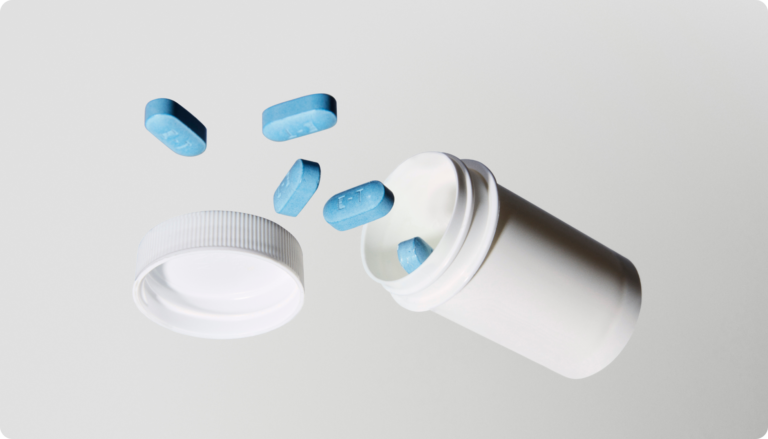Taking PrEP to reduce your risk of contracting HIV infections is a smart decision for anyone who believes they could be at risk for exposure.
However, if you’re going to start taking PrEP medications (either daily or as needed), it’s important that you know what the side effects of PrEP are, so you know what to expect.
To help you make sense of both the short- and long-term side effects that you could experience while taking PrEP medications, the Felix Team has gathered some useful information for you. When you’re done with this page, you should feel much more confident about the safety of your PrEP medications.
Short-Term Side Effects of Prep
On average, clinical trials have shown that around 1-10% of patients experience short-term side effects from PrEP medications. Let’s discuss some of these potential side effects.
Does PrEP Cause Nausea?
In some cases, yes, PrEP medications can cause nausea or even vomiting.
Usually, the nausea is mild and should lessen or disappear within a week or two.
Can PrEP Cause Headaches?
Yes, sometimes PrEP medication can cause headaches, but it’s not very likely.
Again, this is usually not a severe side effect, and it should pass or at least reduce after a week or two of use.
Will PrEP Cause Diarrhea?
Yes, PrEP can sometimes cause diarrhea, but it’s not very likely.
Like other short-term side effects of PrEP, if you start to experience diarrhea, it should lessen or stop within a week or two of starting your medication.
If you’re finding any of the short-term side effects of PrEP are becoming severe or intolerable for you, don’t hesitate to talk to your healthcare practitioner at Felix. They may be able to suggest alternative dosages or PrEP medications that may work better for you.
Long-Term Side Effects of PrEP
It’s important while taking PrEP medications long-term that you get a check-up every 3 months. This way, your healthcare practitioner can ensure that your medications are being tolerated well, and that it’s not starting to negatively impact your health.
There are a few specific long-term side effects that you should keep an eye out for, as they can indicate that the medications are starting to have a negative long-term impact on your body, such as:
- Yellowing of the eyes or skin
- Loss of appetite
- Change of colour in either your stool or urine
- Excessive abdominal pain
- Fast or abnormal heartbeat
Now, let’s discuss some of the things these long-term side effects of PrEP medications can mean.
Will PrEP Affect Liver Health?
No, PrEP shouldn’t impact the health of your liver.
However, while PrEP medications may impact the toxicity levels in your liver, these effects were reversed once the patient stopped taking their PrEP medication, resulting in no permanent damage.
Does PrEP Affect Kidney Health?
Yes, for some patients, long-term use of PrEP medications can lead to negative impacts on your kidney health.
Again, these levels of toxicity have been shown in many cases to be reversible if the patient stops taking the medication, protecting them from permanent damage.
Does PrEP Affect Bone Density?
Yes, in some cases, PrEP can begin to affect your bone density with long-term use.
Just like the other long-term side effects of PrEP medications, the toxicity levels causing these changes can be reversed by stopping the medication. For many patients, it means that the health of their kidney, liver, and bone density will return to normal, with no permanent damage done.
If you’re concerned that you’re starting to experience some of the long-term side effects of PrEP, be sure to talk to your healthcare practitioner at Felix. They may be able to suggest alternative dosages or medications that may work better for you.
When to See a Healthcare Provider
You should be doing check-ups with your healthcare practitioner at least once every 3 months, to ensure that the PrEP medications aren’t having a negative impact on your overall health.
Anytime you’re taking PrEP medications, and you start to experience worrying side effects (both short- and long-term), you should connect with your healthcare practitioner at Felix. If you start to experience severe side effects, or the symptoms of an allergic reaction, contact 911 or visit your local ER as soon as possible.
They’ll be able to ensure that you’re protected from severe side effects, while providing you with alternatives that you can use to continue ensuring you’re protected against HIV.
Also, if you become pregnant, are exposed to multidrug resistant HIV, or you have a positive HIV test, you should contact your practitioner right away.
If you haven’t started the process yet, all you need to do is complete a short online assessment, and one of our experts will take it from there.
With Felix in your corner, you can rest assured that you have all the medical knowledge and assistance you need to take back control of your sex life on your terms.




